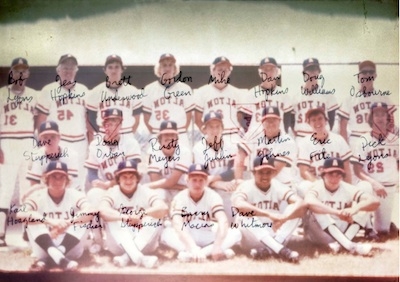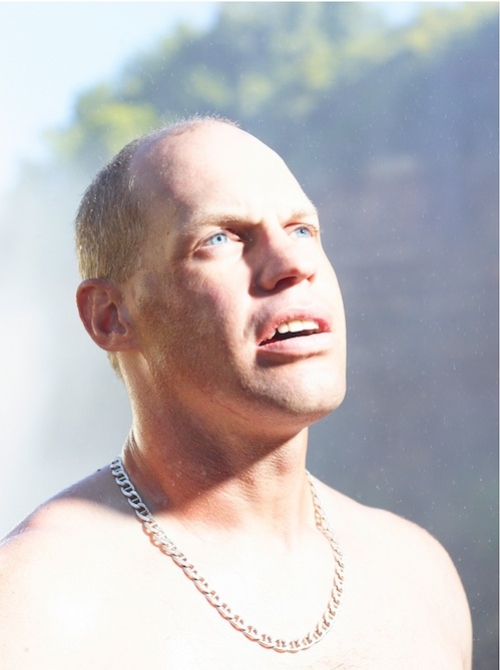Photographer Profile - Tabitha Soren: "As I watched the players, some larger ideas took shape"

|
|
|
Soren, the one-time MTV journalist turned fine-art photographer, began the project in 2003, when she visited the Oakland A’s spring training camp in Arizona and met the 40 players drafted by the team the previous year. She had been invited to the camp because her husband, Michael Lewis, had recently written the book Moneyball: The Art of Winning an Unfair Game, which focused on the A’s general manager, Billy Bean.
As it happened, Soren had recently seen an exhibition featuring Dutch photographer Rineke Dijkstra’s portraits of Israeli soldiers, a typological study of young people maturing within a specific institutional framework. As she looked at the fresh-faced ballplayers taking part in their first big-league training camp, she began to think about creating a series along the same lines.
“I thought I could capture these young men at the beginning of a journey and create psychological portraits as they developed,” she says. “I wanted to see in their faces how they changed as they became successful sports commodities, or how they handled failure.”
Instead, she found something else. Rather that using her camera to capture the inner characters of the ball players, Soren used the ballplayers to shed light on the character of America. The result is her series “Fantasy Life,” on view at Los Angeles’s Kopeikin Gallery through June 6. The work features an intriguing mix of styles—everything from traditional portraiture to landscapes and tintype action images. Some of the images in the series were shot off of TV screens—Soren's way of representing the perspective of most baseball fans.
“As I watched these players over time,” she says, “some larger ideas took shape.”
Looking Beyond the Game
Soren certainly isn’t the first person to identify the strains of American exceptionalism through the prism of the national pastime. In his 18-hour documentary about baseball, filmmaker Ken Burns saw the game’s cultural significance nearly everywhere he looked. Conservative political commentator and baseball fan George Will has noted that “nothing is trivial about baseball” and has worked earnestly to find bedrock American virtues in things like the Infield Fly Rule.
But Soren has uniquely taken baseball into an artistic realm, observing the game not with a fan’s rapture, but with a bystander’s curiosity, and then using her observations to articulate ideas about American life.
“I thought I would fall in love with baseball the more I learned about it, but I didn’t actually get that engrossed with the game itself,” she says. “But I kept getting more intrigued because I couldn't understand why people were so obsessed with it.”
Soren struggled at first as she tried to find her own way to look into the lives of the young players she had determined to follow. “I couldn’t just re-do what Rineke Dijkstra had done; I needed to find something different,” she says. “I just wanted to get inside of it. I felt that an artist’s job is to make sense of what’s going on around them.”

She tried a number of approaches, including traditional portraiture and what she calls “artsy-fartsy pictures of the players,” but couldn’t find her voice. “Once I stopped trying to love the game, those pictures became more prevalent, and the guys I was photographing became more perplexed by what I was doing,” she says. “But they accepted me that way. It was, ‘Oh, here she is, the weird girl with the camera, she’s never pointing it in the right direction.'"
Over the following years, she followed the players as they made their way through the minor leagues. When someone was traded to another team, she would catch up with them on road trips. Because she lives in Berkeley, CA, she was able to photograph the lucky few who made it into the majors when their teams came to the Bay Area to play the A’s or the San Francisco Giants.
“They got to the point,” recalls Soren, “where somebody would have a bone-spur operation or have some other piece of their body taken out, and it was like, ‘What do I do with this? Well I’ll give it to Tabitha, maybe she’ll want it for something.’ It got very intimate.”
The Kopeikin Gallery show includes a vitrine of more than 40 bone spurs, some taken out of players during surgery. Soren calls the bone fragments "just one of the ways these guys make a sacrifice to greatness."
Five American Fantasies
Over time, Soren’s interest in the players became secondary to her interest in baseball as an an emblem of American mythology. Her background in political reporting probably helped focus her thinking. So did the Stanford University journalism fellowship she undertook after leaving MTV. It was there that she was introduced to American art history through professor Alexander Nemerov and began creating her own fine-art work under the tutelage of photographer Joel Leivick.
“They were so inspiring and made me feel like I had something to say that was more subtle and nuanced than I was able to say via journalism,” says Soren.
The work she went on to make is literary in its use of metaphor. Soren says her photography “visualizes psychological states.” Her series “Running,” shot between 2010 and 2013, probes the flight or fight response to danger. With her baseball series, she widens her scope to comment on cultural traits.

Soren came to identify five quintessential American fantasies reflected by the game: the idea of manifest destiny, the romantic notion of the restless wanderer, the confidence that failure is just a step toward success, the assumption that the pursuit of fame and fortune is also the pursuit of happiness, and the belief that to secure your identity you need to stand apart from the community.
Threading all the fantasies together are the intertwined ideas of American ambition and uprootedness. “In America, the idea of moving across the country for a job is considered totally normal,” Soren says. “In many other countries in the world, people would never think of that. I never thought I would do anything except that.”
Soren’s images go well beyond the platitudes about teamwork, fair play and competition associated with sports in general and baseball in particular. “It’s not that I disagreed with all of that,” she says. “I just didn’t want to take those meanings on face value.”


